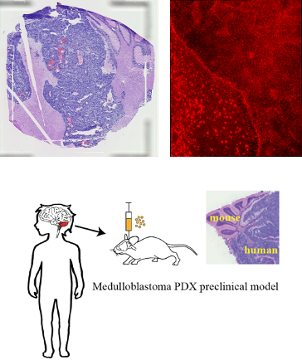Drug resistance in Brain Cancer
Brain tumours are the leading cause of cancer-related death in children, with Medulloblastoma (MB) representing the most common paediatric malignant brain tumour. Despite aggressive treatment approaches, a significant proportion of MB patients relapse, almost always leading to death. Tumour progression, resistance to therapy and relapse are dependent on intratumoural heterogeneity, which derives from a wide variety of cell types present within a tumour.
Objective/mission (the vision)
We aim to develop targeted approaches to identify and eradicate resistant cells by detecting cell-type specific responses to treatment in the context of the interactions with other cell types within the primary tumour.
Research approach (the initiative)
We have built a highly innovative technological and analytical platform to identify resistant cells by quantifying cell-type specific responses and preserving the physiological tissue context of all cell types. By combining spatial sequencing with tissue imaging, we will generate unprecedented insights into how MB cells and other cell types interact, evolve and respond to treatment both in a spatial and temporal context. This part of the work uses patient derived xenograft mouse models.
Impacts and applications
This work will allow for a more sensitive and accurate characterisation of Medulloblastoma evolution throughout drug treatment. The outputs will guide clinical trials and the development of new combination therapies for children diagnosed with this disease.
Partners/collaborators
We are collaborating with Dr Laura Genovesi (UQDI), Prof Brandon Wainwright (UQDI), A/Prof Vanessa Bonazzi (UQDI), Prof Bryan Day (QIMR), Dr Rochelle D’Souza (QIMR), Dr Samantha Stehben (IMB), Prof Andrew Mallett (IMB)


